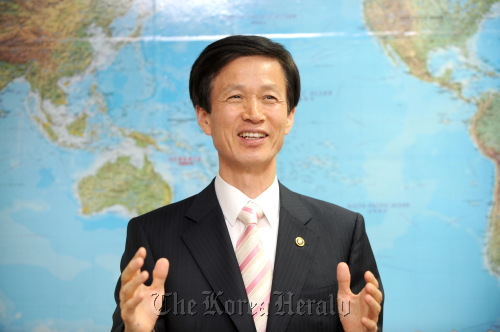Korea will lead international efforts to combat desertification in Asia based on its experience of forestation, Lee Don-koo, head of Korea Forest Service said.
“Korea is ahead of others in turning wasteful land into productive land. We have an important role to play in the world’s fight against desertification at conferences and partnership arrangements,” Lee told The Korea Herald.

Korea Forest Service Minister Lee Don-koo
The forestation expert said the ministry is waiting to share its decades-long experience at the October conference of the United Nations Convention to Combat Desertification in Changwon, South Gyeongsang Province. The UNCCD is the world’s first and only legally binding convention program to address the problem of desertification. Lee feels the gathering of 194 member nations for the cause is essential not only to showcase the nation’s successful forestation but because taking action to save soil is an imperative task at the global level.
“Land measuring up to 1.2 times of South Korea becomes desert every year globally, which is an alarming pace that threatens crop production and other land use for living. Advanced countries such as Australia, Spain, and the U.S. have resources to tackle the problem but emerging countries such as Mongolia don’t have technologies or expertise,” Lee said.
In Asia alone, 1.3 billion hectares of land in China and Mongolia are deserts. The region is losing about 480,000 hectares of land annually, a size 2.6 times that of Jeju Island.
The Seoul National University professor for agricultural studies explained the vicious cycle and consequences of not taking action. Desertification isn’t just about barren land expanding at an uncontrolled rate, he said, it is a process increasingly caused by overgrazing and deforestation. It pushes farmers and breeders out of business and the land often becomes non-renewable when left unmanaged for too long.
Korea’s forestation know-how
Lee said awareness for measures to fight desertification is relatively low in the country but emphasized that Korea is one of the most affected countries.
“The desertification process in China and Mongolia is making the yellow dust ever more serious here and it is worsening with the global warming. The frequency and severity of the yellow dust originated from northwestern China and southern Mongolia is increasing,” Lee said.
In the 1980s, yellow dust storms hit the Korean peninsula for 3.9 days a year on average. This increased to 7.7 days in the 1990s and to 12.4 days in the 2000s. The Korea Environment Institute says it has caused 3.8 trillion won to 7.3 trillion won of damage to the Korean economy over a decade. Lee emphasized that once arable lands are turned to deserts, it is extremely hard to turn them back to productivity. The October UNCCD COP 10 in Changwon will discuss ways to stop or slow down the process by bringing the private and public sector together across member nations.
The Korea Forest Service, the host organization of the UNCCD COP 10 in Korea, plans to introduce the country’s forest rehabilitation technologies through which devastated forests have been successfully restored. The country is regarded as having successfully achieved both economic growth and forestation. With this experience and expertise, the KFS plans to introduce the “Changwon Accord” which seeks binding agreements on land management projects.
The KFS has been having a number of conferences in the past year to discuss the preparation of the 2011 UNCCD COP 10 where environmental activists, economists and government officials shared opinions about how to promote and enhance cooperation at an international level.
“Korea stands at the right place to make such initiatives because it is the only country that has afforested wasted land in a short period of time and many countries need the know-how of doing that,” Lee added. He hoped to showcase South Korea as a successful case to encourage forestation in other emerging countries.
Bringing Asia together to fight desertification
Korea has been participating in forestation projects in China and Mongolia since 2001. The Ministry has been dispatching forestation experts and partially financed projects in western China, Inner Mongolia and central Myanmar.
“It is also a serious problem for North Korea too. North Korea has about 2.84 million hectares of waste land as of 2008 after it let over 32 percent of its forests to be misused,” Lee said. The Ministry has formed an agreement to help forestation projects of the North back in 2008 but the process has been stalled since North Korea attacked the Navy corvette Cheonan and Yeonpyeong Island last year.
The minister is also planning to launch a regional organization promoting sustainable forest management called the Asian Forest Cooperation Organization under the support of the Lee Myung-bak administration. The establishment of AFoCO is currently on the way after the proposal was adopted and ratified by the Association of Southeast Asian Nations and South Korea. The plan is to bring Asian leaders together once a year to make international regulations on land use and approve budgets for forestation projects.
“South Korea is hoping to be a mediator in bringing advanced and emerging countries together in tackling of the problem,” Lee said.
By Cynthia J. Kim (cynthiak@heraldcorp.com)






